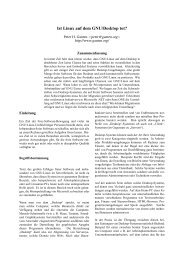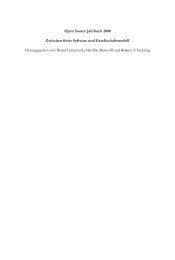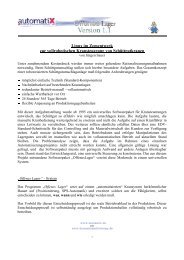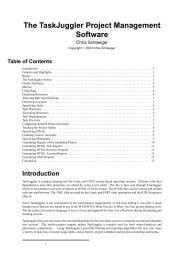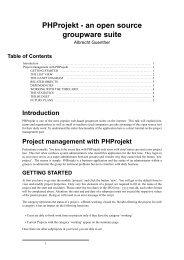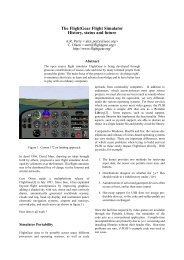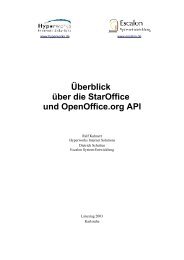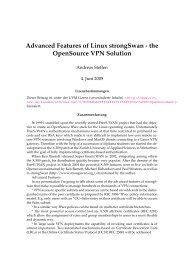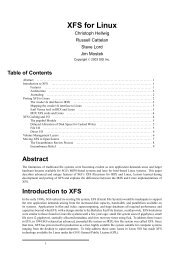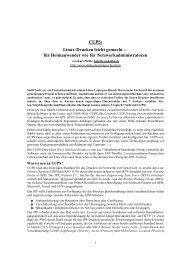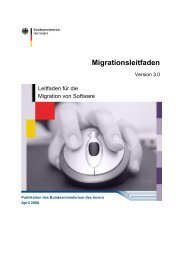Pan-hacker culture and unconventional software innovation ...
Pan-hacker culture and unconventional software innovation ...
Pan-hacker culture and unconventional software innovation ...
You also want an ePaper? Increase the reach of your titles
YUMPU automatically turns print PDFs into web optimized ePapers that Google loves.
<strong>innovation</strong>s develop through the process of socio-technical configuration, the politics<br />
of <strong>innovation</strong>s is forged through the process of representation. However, the<br />
antagonists of Vedel disagreed with him <strong>and</strong> asserted that users have difficulties in<br />
organizing themselves as pressure or lobbying groups because of 'aggregation of<br />
dispersed interests', which are sometimes conflicting if not contradictory. Pierre<br />
Chambat 12 actually said, in front of a highly fragmented <strong>and</strong> specialized technology,<br />
users tend to become rather 'atomized' <strong>and</strong> individualized without common identity<br />
<strong>and</strong>, hence, incapable to mobilize collective action. Vedel's antagonists considered<br />
users as lack of technical expertise, so they thought a number of experts <strong>and</strong><br />
spokespersons of users are emerging, who are often poorly representing their whole<br />
group. Consequently, Chambat remarked, one attends 'an assimilation of market to<br />
democracy, of users to consumers or clients <strong>and</strong> of liberty to choice'. Moreover, he<br />
highlights that 'the privatization of telecommunication companies, the deregulation of<br />
the sector <strong>and</strong> the marginalization of public services push towards the direction, on<br />
the one h<strong>and</strong>, of a debilitation of the institutionalized representation of users <strong>and</strong>, on<br />
the other h<strong>and</strong>, of a reinforcement of the image of the user as a consumer'.<br />
The formation of Linux community proves that Vedel's argument makes sense in the<br />
user-representation in the process of technological <strong>innovation</strong>. Because what Vedel's<br />
antagonists said 'users lack technical expertise' is not true among Linux users. As<br />
mentioned above, as a Linux user, one has to have <strong>hacker</strong>-ship, to be akin on<br />
learning, to be positively participate the <strong>innovation</strong> rather than passively accept the<br />
changes. Therefore, the Linux users definitely are characters of Linux community <strong>and</strong><br />
can be the perfect representation of Linux community.<br />
Nevertheless, Vedel's second argument in his 1994 publication is not the case of<br />
Linux community. From the view of science <strong>and</strong> technology studies (STS), not only<br />
the way users think of a technology <strong>and</strong> its potential uses is a result of a multiplicity<br />
of social, economical <strong>and</strong> cultural factors, but the technology is also shaped by users<br />
themselves as well. Vedel therefore said 'it is interesting to study how the producers<br />
of technology try hard to intervene on the representations of technology that the<br />
users form so as to attempt to direct the users of technology towards their own<br />
objectives'. Nevertheless, in the <strong>innovation</strong> of Linux, users can participate in the<br />
<strong>innovation</strong> process constantly due to the open source traits. The identity of users <strong>and</strong><br />
innovators/developers are overlapped with each other <strong>and</strong> form the hybrid identity.<br />
The hybrid identity enables users to have their own space in the <strong>innovation</strong> field <strong>and</strong><br />
broaden the meaning of a user. The boundary between innovator/developer <strong>and</strong> user<br />
(especially end-user) is getting blurred <strong>and</strong> soft. As long as one is competent, one<br />
can shift his identity from an user to an innovator. This mutual <strong>and</strong> active mechanism<br />
indicates a dynamic <strong>innovation</strong> system <strong>and</strong> provides the prosperous Linux<br />
community.<br />
From a chronic view, the diffusion of Linux is still complying with other traditional<br />
technological <strong>innovation</strong>s. Linux usage is stepping into the stage of late majority.<br />
Because of the reliability <strong>and</strong> efficiency of Linux, more end-users such as companies<br />
or governmental organizations choose to use Linux rather than other commercial<br />
<strong>software</strong>. This is not as of the effect of vendors/distributors' advertisements nor of the<br />
apparently cheaper price (or free price). The most important factor influencing the<br />
development of Linux is the collective <strong>hacker</strong>-ship (practices) <strong>and</strong> intense virtual<br />
communication among users in the Linux community. The spirit of information<br />
sharing brings Linux community more users. And the truth is while more users can



